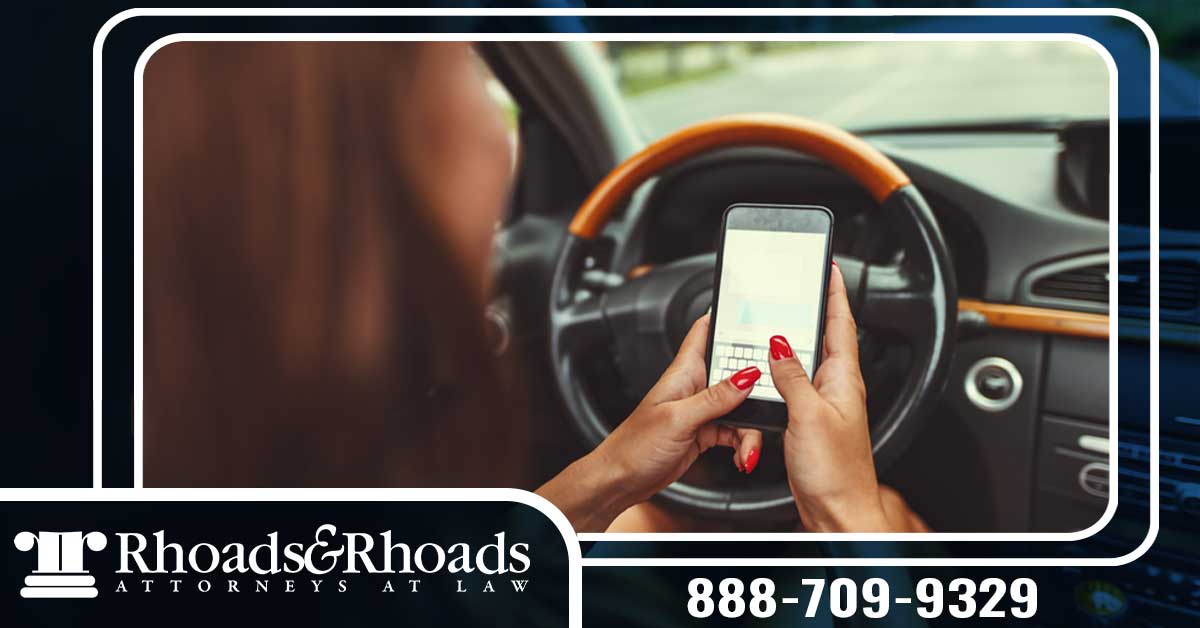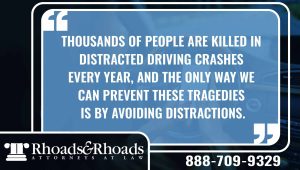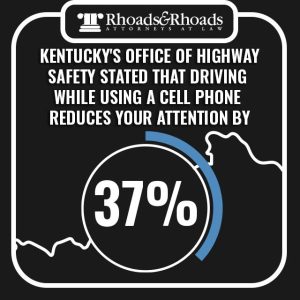
Distracted driving is incredibly dangerous and causes hundreds of thousands of car accidents every year in the United States. Crashes involving distracted drivers, whether commercial drivers or civilians, are often serious, causing life-changing injuries and traffic fatalities.
 While you may already be aware of the dangers of cellphone use, numerous other distractions while driving can lead to devastating accidents. Taking your eyes off the road for even a second can endanger others’ lives, and it’s critical to avoid any other activities that can cause you to drive distracted, such as eating, self-grooming, adjusting your radio, and more.
While you may already be aware of the dangers of cellphone use, numerous other distractions while driving can lead to devastating accidents. Taking your eyes off the road for even a second can endanger others’ lives, and it’s critical to avoid any other activities that can cause you to drive distracted, such as eating, self-grooming, adjusting your radio, and more.
Sadly, distracted driving deaths are common in Kentucky, and these accidents are entirely preventable. To reduce the number of these motor vehicle crashes, Kentucky drivers need to educate themselves on different types of distracted driving that may lead to a serious crash. Additionally, Kentucky drivers should know the risks of driving distracted and the state laws and insurance guidelines regulating distracted driving.
In this article, you’ll learn all about distracted driving laws, accident statistics, preventing driver distraction, and what to do if you crash with a distracted driver while driving.
What Is Distracted Driving?
When people hear the term “distracted driving,” they usually think of teens texting while driving or engaging in another activity that requires them to take their eyes off the road. The truth is that numerous motorists across different age groups drive distracted every day, and these distractions often don’t even involve cell phone use.
The definition of distracted driving is engaging in an activity that takes your focus away from the road and operating your vehicle. This doesn’t necessarily need to be a visual distraction, such as using a cell phone — you can even become distracted if your mind wanders. It’s critical that you always maintain focus on the road and avoid anything that may take your attention away from the task of driving.
Types of Distracted Driving
According to the Centers of Disease Control and Prevention (CDC), there are three main types of distractions: visual distractions, manual distractions, and cognitive distractions. The definitions of these main types are fairly self-explanatory, but let’s unpack them and explore common examples while driving.
Visual distractions take your eyes off the road. Some common forms include monitoring your GPS, glancing at a passenger, reading a text message, and looking at yourself in the mirror.
Manual distractions refer to anything that takes your hands away from the controls, as it’s safest to keep both hands on the wheel at all times. Common types of manual distractions include texting, changing the radio station, self-grooming, eating, drinking, smoking, and adjusting your GPS.
Finally, cognitive distractions keep you from fully paying attention to the road. Unfortunately, mental distractions are incredibly common, such as listening to music or a podcast, attempting to talk on the phone, and interacting with a passenger.
It’s critical to avoid these three types of diversions, as any one of them can lead to fatal consequences. Always ensure to keep your eyes on the road, your mind focused, and your hands in control when operating a motor vehicle.
The Dangers of Distracted Driving
 As we’ve discussed, driving while distracted poses a serious risk to others on the road as well as your own passengers. Picture this: You take your eyes away from the road for five seconds to read a text, look at your phone, or adjust your navigational device. If you were traveling at 55 miles per hour, you spanned the length of an entire football field within those five seconds. While a football field feels like a long distance, you could have caused a serious car accident within that brief time.
As we’ve discussed, driving while distracted poses a serious risk to others on the road as well as your own passengers. Picture this: You take your eyes away from the road for five seconds to read a text, look at your phone, or adjust your navigational device. If you were traveling at 55 miles per hour, you spanned the length of an entire football field within those five seconds. While a football field feels like a long distance, you could have caused a serious car accident within that brief time.
While driving distracted is always dangerous, driving while texting is especially hazardous, as it combines all three types of distractions. Reading a text message takes your eyes and attention away from the road, and text messaging without a hands-free device also requires you to take your hands off the wheel. Texting is like keeping your eyes closed while driving — it’s incredibly dangerous and may cause a fatal crash.
When you consider the different ways texting diverts a driver’s attention, it’s not surprising that cell phones play a major factor in distracted driving statistics. Cell phones contribute to 1.6 million crashes annually in the United States. Additionally, Kentucky’s Office of Highway Safety stated that driving while using a cell phone reduces your attention by 37%, and it reduces your reaction time as much as having a blood alcohol concentration of .08%. It’s clear that phone use while driving creates unnecessary risk and can lead to distracted driving deaths.
How to Prevent Distracted Driving
Thousands of people are killed in distracted driving crashes every year, and the only way we can prevent these tragedies is by avoiding distractions. Remember to always refrain from multi-tasking in the car, and don’t engage in an activity that takes your focus away from the task of driving.
Another important way you can help prevent these collisions is to raise awareness. April is officially Distracted Driving Awareness Month, but we should educate others on the dangers of distracted driving year-round.
Distracted Driving Statistics
In 2023, the National Highway Traffic Safety Administration (NHTSA) released revealing data showing an increase in distracted driving accidents. This data is from 2021 and shows a 12% from the previous year. There were hundreds of thousands of crashes and injuries caused by distracted drivers, and Kentucky was one of the worst states for driving distracted.
According to Kentucky’s Office of Highway Safety, distracted drivers cause over 50,000 crashes in Kentucky annually, resulting in over 15,000 injuries. Tragically, distracted driving fatalities are also common in the Bluegrass State.
Distracted Driving Fatalities
 The National Highway Traffic Safety Administration’s data showed that there were 3,522 driving fatalities in 2021 caused by drivers who were distracted. Additionally, nearly 16,000 people were killed in distracted driving crashes in the last five years, and driving distracted causes 8.8% of collisions in the United States.
The National Highway Traffic Safety Administration’s data showed that there were 3,522 driving fatalities in 2021 caused by drivers who were distracted. Additionally, nearly 16,000 people were killed in distracted driving crashes in the last five years, and driving distracted causes 8.8% of collisions in the United States.
In 2021, distracted drivers caused 120 fatal accidents in Kentucky, resulting in 136 deaths. That means there were 27 fatal collisions per 1 million people in the state and distracted driving accounted for 16.35% of all fatal accidents in Kentucky. This was a 30% increase in traffic fatalities from the previous year.
Interestingly, the most dangerous months for distracted driving were from May to October, and the safest month is February. Additionally, distracted driving statistics indicate that fatal accidents are far more common on non-interstate roads, with only 14% of accidents occurring on the interstate.
What Age Groups Are Driving While Distracted?
The Centers for Disease Control and Prevention’s (CDC) data indicates that younger drivers, including teens, are more likely to drive with a distraction, such as talking to passengers, eating, or texting. That said, NHTSA’s data shows that teen drivers didn’t cause as many distracted driving accidents as another age group.
Further study shows those in addition to teens, those between the ages of 25 and 34 caused the most fatal distracted driving car accidents. In Kentucky and many states, the most distracted drivers were between the 45 and 54 years old. Additionally, males contributed to far more of these fatalities than females. Male drivers accounted for 79 accidents while females driving caused 39 car accidents.
Common Causes of Distracted Driving Car Accidents
As we’ve discussed, any distraction can cause serious injury crashes or fatal crashes, and it’s best to avoid driving distracted entirely. Still, some forms of distracted driving contribute to more car accidents than others.
The most common causes of distracted driving car accidents include:
- Texting
- Talking on the phone
- Applying makeup
- Talking to passengers
- Eating
- Reaching for objects within the car
- Staring at visual distractions outside of the car
Kentucky Distracted Driving Laws
Distracted driving laws differ from state to state. In Kentucky, it’s illegal for a driver to text or send an email while their car is moving, but you can text and email with a hands-free device. While texting is prohibited, you are legally allowed to use your cell phone to make phone calls as long as you’re over 18. Those under 18 are prohibited from any kind of cell phone use, even if they have a hands-free device.
Although it’s legal for you to make phone calls or engage in other diversions behind the wheel, it can cause a devastating car accident. It’s best for drivers to refrain from all visual, manual, and cognitive distractions.
Who Is At Fault After a Distracted Driving Collision?
While it’s not illegal to talk on the phone or engage in other forms of distracted driving, it can make you liable for a traffic accident. If the distraction caused the accident, you’ll be liable for any damages not covered by the other driver’s insurance institute.
For instance, let’s say that another driver ate a burger while driving, and they crashed into you because they were visually and manually distracted. It’s not illegal to eat while driving, but their negligence still caused your accident. If you have damages not covered by your own auto insurance and personal injury protection (PIP) insurance, the distracted driver should be liable for your losses.
Filing a Claim Against a Distracted Driver
If you collide with a distracted driver, it’s essential for you to gather evidence showing that they were at fault. Some forms of evidence to show your insurance include:
- Eyewitness testimony
- Photographic or video evidence
- Phone records
- The police’s report
- Accident reconstruction experts
- Statements from the other driver admitting they drove while distracted
You’ll also need to retain proof that you suffered damages, including your medical bills, vehicle repair costs, and any other expenses that resulted from the accident.
Injured in a Crash Caused? Contact an Attorney Today
If you’ve were involved in a crash that left you with expensive injuries, contact Rhoads & Rhoads Attorneys at Law. We have years of experience helping Kentucky drivers recover the money they deserve from negligent drivers. Schedule your free case evaluation today online or by calling 888-709-9329.


